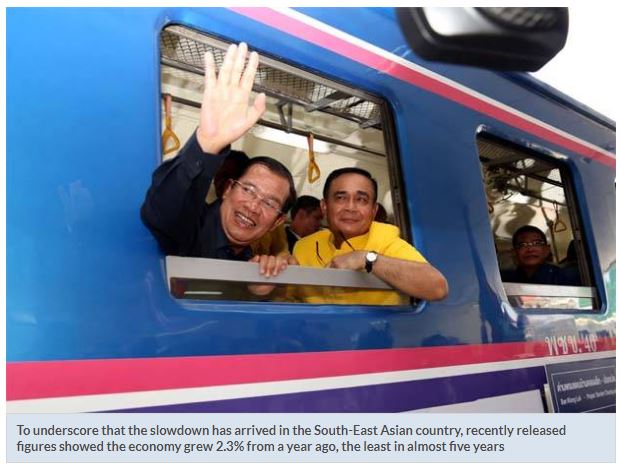Thai economy weakens, with a twist: The baht’s too strong
THE policy torpor in Bangkok is over. After sitting out interest-rate cuts and growth warnings that have swept both the developed world and emerging markets for most of the year, Thai authorities are getting anxious. If this unlikely haven, which lit the fuse of the Asian crisis two decades ago, is now fretting, everyone should be concerned.
This month’s unexpected rate cut by the Bank of Thailand jolted observers who had become used to Thai policymakers not being much inclined to touch borrowing costs. The step was the exclamation point on a trio of surprise reductions across Asia on Aug 7.
Officials have signaled that they’re open to further easing, perhaps in conjunction with some kind of fiscal package.
This is welcome. The radio silence was starting to resemble passivity.
To underscore that the slowdown has arrived in the South-East Asian country, recently released figures showed the economy grew 2.3% from a year ago, the least in almost five years. Expansion for 2019 will be between 2.7% and 3.2%, the government reckons, down from a previous projection of as much as 3.8%. For good measure, the central bank foreshadowed cuts to its own forecast, a strong hint that further stimulus is in the works. Far from a 1990s-style disaster, but not good. That mirrors a wider view of Asia’s circumstances and, for that matter, the world.
While individual countries teeter on recession, a global contraction isn’t likely. Policy is being re-calibrated before the hit to the economy becomes dire. Unlike Asia in 1997-98 and the West a decade later, the banking system is considered relatively sound and floating currencies mean nations are less likely to destroy reserves propping up artificial exchange rates.
No two downdrafts are the same and most disrespect borders. This slowdown has distinctly Chinese characteristics. Two decades ago, China’s economy was growing fast but still a relative minnow; today, it is the world’s second largest and figures in all calculations.
That’s reflected in how the Washington-Beijing trade tussle buffets Asian and global markets and erodes business confidence. If China slows, so does pretty much everyone.
In Thailand, it’s inflicting an additional casualty: the tourism industry, which authorities had tipped to have a bumper 2019.
One of the big stories in the past few years has been the boom in arrivals from China and its impact on leisure hot spots like Thailand and the Philippines. Chinese tourists account for about 30% of all visitors, according to Capital Economics.
One twist on Thailand’s predicament is that officials think the baht is too strong. The currency’s plunge in 1997 ignited a broader Asian meltdown, but lately it has been having a stellar run.
It’s the best performing play against the dollar in the past 12 months against the dollar, according to data compiled by Bloomberg, gaining about 6.5%. The South Korean won, Malaysian ringgit, the Taiwan and Singapore dollars have retreated, albeit not dramatically.
The idea of the baht as a storm shelter seems to alarm the Bank of Thailand.
Last month, it placed restrictions on non-resident baht accounts, signaling unease about the pace of capital inflows and their effect on economic competitiveness.
The baht’s vigor figured in deliberations about August’s rate cut, minutes show.
An earlier generation of Thai economic stewards would have killed for this problem. They tried to prop up the currency before being forced to abandon their efforts and let it tumble, calling in a rescue from the International Monetary Fund.
This time, it’s the baht’s inclination toward strength that bothers them.
Observers generally attribute the baht’s rude health to a current-account surplus and plenty of foreign reserves. I find this explanation too evergreen. It’s fair to wonder how long the baht can defy economic gravity.
Bangkok is right to acknowledge the weaker broader environment and to take steps to address it. With luck, policymakers might even take the baht down a rung or two. You don’t have to be a history buff to appreciate the irony. — Bloomberg OpinionThe views expressed here are solely that of the writer.
Source: https://www.thestar.com.my/business/business-news/2019/08/23/thai-economy-weakens-with-a-twist-the-bahts-too-strong#2U0qkAFl0S1WIIu5.99


 English
English




